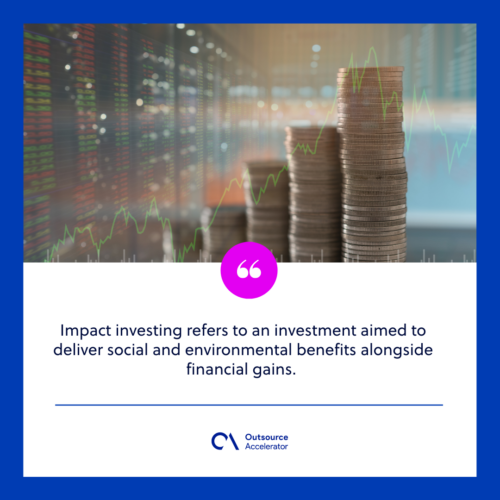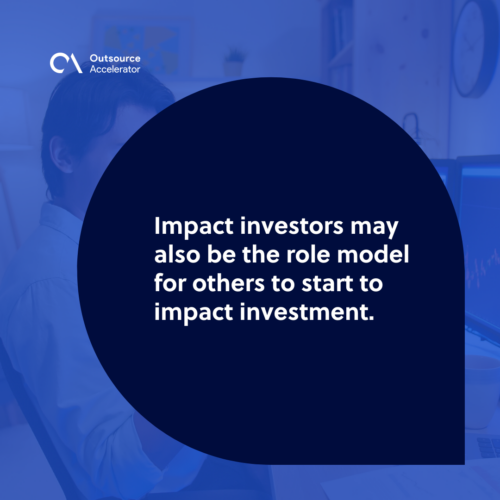Impact investing
Definition
What is impact investing?
Impact investing refers to an investment aimed to deliver social and environmental benefits alongside financial gains.
For instance, an investor funds renewable energy projects because they believe that they can make a positive change in the environment.
In accordance with the UN’s Sustainable Development Goals (SGDs), investors increasingly commit to this risky investment and fund socially responsible (SRI) and environmental, social, and governance (ESG)-related projects.
It is a purposeful investment strategy in firms or organizations targeting a strong financial return.
It depends on the investor’s strategic goals, and impact investment can be made in the form of different asset classes such as equities, bonds, mutual funds, venture capital, exchange-traded funds (ETFs), or cash equivalents.
According to the Global Impact Investing Network (GIIN) study, an estimate of US$715 billion in impact investing was provided by 1,720 organizations in December 2019.
Research shows that the sustainable investing and impact investing industry continued to escalate, with the sustainable funds of $330 billion in September 2021. In the same year, a record-high 38 sustainable funds were launched in the US.
According to GIIN, investors who make impact investments include fund managers, development finance institutions, diversified financial institutions/banks, private foundations, pension funds, insurance companies, family offices, individual investors, NGOs, and religious institutions.

How does impact investing work?
Impact investing can cover different sectors. Investors provide capital to address issues relating to agriculture, renewable energy conservation, accessible healthcare, and education or affordable housing.
A well-known real-world example of impact investing is the Gates Foundation. An estimate of $2.5 billion funds deployed by the Gates Foundation is reserved for impact investing to support organizations and projects with the goals of improving sectors like health, education, and gender equality.
The primary goal of impact investing is to lessen the impact of commercial activity on the environment. Investors go beyond avoiding harm and continuously pursue this philanthropic pursuit for a positive social, economic, and environmental change.
Key elements of impact investing
With the goal of financial return, impact investment requires clarity on the involvement in impact investing. As such, the Global Impact Investing Network (GIIN) developed four core characteristics that provide references as a guide for expectations and standards for impact investing.
Intentionality
Impact investors must have the intention to “contribute to measurable social or environmental benefits.” In contrast with other investments, impact investing at the core is about setting goals to address worldly issues to achieve a positive impact.
Using evidence and impact data on investment design
According to the GIIN, in-depth research and empirical evidence in the various disciplines are the key tools to kick off impact investments, which will be the basis of goals and objectives and for validating results.
Managing impact performance
There is a need for “feedback loops” in impact investing as it measures an investment’s impact towards reaching the set objectives.
Contributing to the growth of the industry
Impact investors may also be the role model for others to start to impact investment. With that, their learnings and experiences through their design goals and strategies, data, and their performances will be beneficial for others to learn.

How does impact investing differ from socially responsible investing (SRI) and environmental, social, and governance (ESG)?
Socially responsible investing (SRI) and impact investing both encompass the same goal of positive social and environmental impact. However, SRI is more into specific investments. Investors look for companies that support such values concerning social impact, environment, and others.
For instance, investors may not choose companies that proactively operate tobacco as it may affect people’s health in general.
Environmental, social, and governance (ESG), on the other hand, set specific criteria to filter out companies that might be risky and have the possibility of investment losses.
Ultimately, companies that appear to be irresponsible and unethical in their practices must be avoided.
Why does impact investing matter?
A survey by GIIN in 2020 reveals that investors who practice impact investors aim for market-rate return. However, the financial returns of impact investment might be lower than the market average.
Additionally, impact investing helps your business to carry out initiatives with your own funds. It allows you to meet entrepreneurs and innovators from various sectors. As such, this will attract investors to your business even more.
The UN’s 2020 progress report on Sustainable Development Goals (SDGs) reveals that there are still gaps and challenges in dealing with social and environmental issues.
Impact investing is a great way to avoid depleted resources. Generally, without the raw materials, the business is impossible to operate.
By engaging in impact investing, companies and organizations can contribute to conserving resources as it will be a huge factor in ensuring business continuity.







 Independent
Independent




